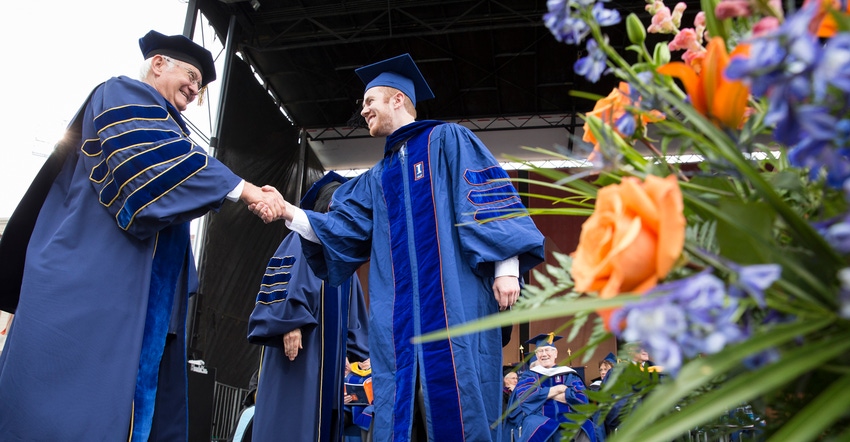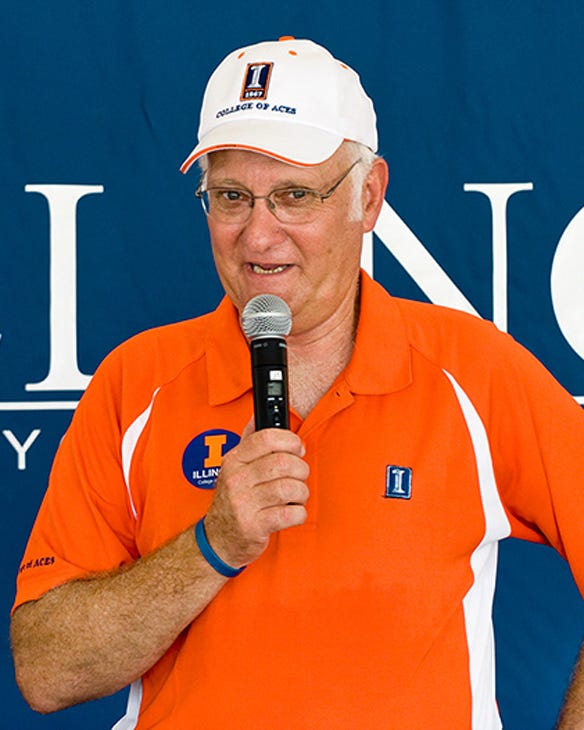
Mention University of Illinois leadership over the past few years and there’s a name that surfaces in nearly every conversation, as heads nod in profound respect: Bob Easter.
He’ll joke that he’s served as an “interim” of nearly every level of leadership, but it’s a joke that belies the truth of how his steady leadership and deep knowledge of the university helped him lead the institution out of scandal, as provost, chancellor and then president.
It was in 2009 when he retired the first time, following seven years as dean of the College of Agricultural, Consumer and Environmental Sciences (ACES). Within months, Illinoisans learned hundreds of subpar students had been admitted to the university after interference by lawmakers and trustees, in a shadowy admissions process.
In one well-publicized instance, a relative of a fundraiser for Rod Blagojevich was admitted at the behest of the then-governor. In the wake of the scandal, Easter was called out of retirement to be interim provost. As upper leadership continued to resign, he became chancellor. When he tried to retire again, he was named president in 2012.
Here, Easter shares about leadership, how he righted the university ship, and how his background wrangling hogs helped him do it.
Where did life start for you? My grandfather was from western Missouri and in the early 1900s, he�’d been successful in the hog business. They were marketing this land west of San Antonio, Texas, as being the next central valley of California. You could drill a well and literally, the artisan water would flow. They would run excursion trains down with these Midwesterners, and Granddad went on it. The only thing I could ever figure, must have been a hard winter in Missouri.
He came back to Independence, Mo., sold the farm, loaded the family and moved to Texas. I went to junior college and then Texas A&M, and did an undergraduate degree in ag education. The fellow who taught pork production asked me if I'd have thought of doing graduate work in swine nutrition. We'd always had hogs, and I thought that might be interesting. I did a master's with him, and one of his good friends was David Baker, who was on the faculty here at Illinois.
So it seemed inevitable that I'd come to Illinois for my Ph.D. I had two job offers when I finished: one at Illinois and one at Texas A&M. And that was a really tough decision.
When you were leading the university out of the admissions scandal, what was something that helped right that situation? Really, I don't really think I deserve that much credit. Having somebody in that role that had a long experience at the institution, understood it deeply and had built relationships was helpful.
I was at a point, where in life, where I wasn't worried about my next job. I had no ambition to be a long-time administrator. I think that gave me some freedom to make decisions that weren't encumbered by concerns about how this is going to work.
Coming out of a college of agriculture, there's a culture that's more about “Let's get the job done,” not figure out whose fault it is.
How do you approach a problem and solve it? There's something good in everybody. Everyone has something there and you just need to work with them and find it.
When someone comes in unhappy, give them an opportunity to say what they want to make their point. And don't dismiss it because everyone has, in their mind, a valid sense of how something should be done. And I think in most people's hearts, they kind of know what the right answer is. But, if you give them a chance to talk, they might not be happy, but they’re willing to accept something.
What frustrates you? When if you get in a situation where you really can't get to that kind of conversation. It seems like we're in a time now where people don't necessarily want to have hard conversations.
But growing up in a small, rural community, you learn life lessons: Deal with it because you can't run from it. You're gonna have to live with these people the rest of your life, so you just don't want to burn bridges completely.
Have you always been a leader? I don't know why, but I was always the class president for four years in high school. I was the student body president at the community college. I was in the student senate at Texas A&M. I was a state FFA officer.
Then Uncle Sam called and I went to Fort Knox, Ky. My day as platoon leader came, and it was a miserable day. We were supposed to do some crawling. Nobody wanted to do it. My job was to get people to do it. And that's when I realized I didn't really know much about leading. It was a lot more than making speeches and being political. There's a lot more to leadership than that. How do you motivate people to do things that they really don't want to do?
 LEADER: Integrity, fairness and strength are what people most often associate with Bob Easter.
LEADER: Integrity, fairness and strength are what people most often associate with Bob Easter.

That’s the essence of leadership, isn't it? Yes. I think a lot about what really makes a successful leader. Some characteristics are probably innate. You have to have a vision. You have to be transparent. You have to be trustworthy, because if people don't trust a leader, they're not successful.
How do you motivate people to do things they don't want to do? You know, you're basically trying to convince them that it's something that needs to be done and they have a role to play. As an administrator, you have incentives. You can put things on the table. If you do this, we'll pay you this or you won't have to teach this class or whatever. And those things work.
Transactional leadership is you do this and this is what you get. It's a deal. Transformational leadership is where you get people to go beyond that. And that's the challenge.
How have you known when it was time to make a change in your life? I think the door opens. But I'd been dean for eight years, and I was beginning to get a sense of a need to move on — and that I've tried all my tricks. You just get a feeling that you're not making the contribution you once did.
What do you want your life to be about? I guess I’d like people to say, “He did his job.”
EASTER REFLECTS
On choosing Illinois over Texas A&M:
“It was pretty clear that if I was going to work in the swine industry, I needed to be where that industry was, and not in cattle country. It turned out to be an incredibly fortunate opportunity for me to be at the University of Illinois.”
On life:
“I have a picture of me at about 12 years old. I'm out in the hog lot in southwest Texas, close to the border with Mexico, kneeling down with a pig. I've got on a hat, the boots. I'm a real cowboy. And I think if I could just tell that kid what's going to happen to him, he would be scared to death.”
On farming:
“By the 1960s, the water was basically gone. It was a desert. Dad said to me, ‘You've got to get an education and get out of here and don't look back.’”
On big moments:
“Chris Kennedy called, wanting to know if we could talk about me coming back to be president. And he began the call by saying, ‘Hey Bob, what are you doing?’ I said, ‘Well, I'm in the middle of a field picking up rocks.’ It was this long pause like I don't know if I need to have this conversation with this guy.”
On what’s next:
“One of the sad things is when people don't know where to go to afterwards. I've always been fortunate to have something else. When I retired from the presidency, I had other things I could do — go back and do ag stuff.”
EASTER IN BRIEF
Truck? Dodge Ram
Tractor? Obviously green!
Pig breed? Mostly commercial, but I had champion at the county fair with a Duroc.
Team? Illinois and the Cardinals
Technology? Information technology
Place to be? Mornings in his sunroom, with newspapers and coffee
Book? The two-volume series by Michael Burlingame, Abraham Lincoln: A Life
Hobby? I enjoy trying to grow stuff.
Family? Wife Cheryl, two children, six grandchildren, ages 6-16
Best advice? Be curious about things around you and never stop learning.
About the Author(s)
You May Also Like






